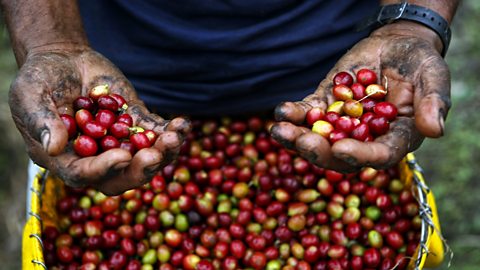Main causes of poverty
There are many reasons why some countries are LEDCs and why people living there find it difficult to move out of absolute poverty.
Climate
Many LEDCs have a very harsh climate. They may have long periods of extremely hot weather, which can affect crops and prevent harvesting. Some of these crops may be exportedTransported and sold to other countries.. If the crops cannot be harvested, the country cannot earn money from trade with foreign countries.
Natural disasters
LEDCs can be badly affected by natural disasters. For example, Bangladesh is one of the world's most densely populatedWhere the number of people per square kilometre is high. countries and is also one of the world's poorest countries. It suffers severe flooding every year. This can cause rivers to be polluted and make drinking water scarce. Many Bangladeshis live in absolute poverty, so the loss of crops and money have caused the cycle of povertyA set of factors which keeps someone in poverty, without hope of an escape. to continue.
Unfair trade

Some farmers in LEDCs do not receive a fair price for the goods they produce, eg coffee. If something happens to the crop because of poor weather, the profits of the retailer do not suffer as the price we pay for coffee can increase, but the farmer's profits do not. The farmer receives a small cut of the price it is sold for in the UK because the price also covers harvesting, exporting, shipping and retailing.
If a product is labelled as fair tradeTrade in which fair prices are paid to the farmers of products., it means that the farmer receives a fairer price for the crops and a Fair Trade premium is put back into their farms and communities to help future development.
Debt
When LEDCs take out large loans from MEDCMore economically developed country (MEDC). This type of country is wealthier or has higher standards of health and education than many other countries. to fund development projects, eg building roads and schools, the interest is often unaffordable and yet it continues to increase. These large debts prevent LEDCs from helping their own people.
War
War increases the problems of debt for LEDCs. The money funding weapons could be spent on food production. If people who usually work as farmers are fighting wars, they cannot grow and harvest food.
Corruption
Some of the aid given to LEDCs never reaches those in need. In some cases it is used to fund wars.
Lack of education
In densely populated LEDCs, many children have little or no access to education. UNESCOUnited Nations Educational Scientific and Cultural Organisation. reports that in Sub-Saharan Africa, many adults cannot read and millions of primary-school-aged children are not in school.
Many people who believe in sustainable developmentEconomic development which meets the needs of the current population without polluting the environment or depleting natural resources. argue that in LEDCs, only education will enable people to help themselves out of poverty.